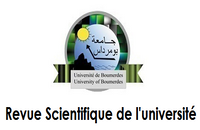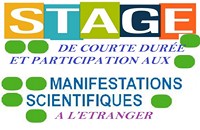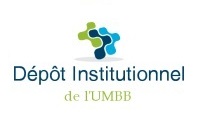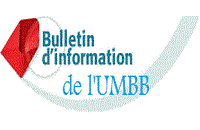International projects
International cooperation in higher education and scientific and technological research, materialized by joint bilateral and multilateral partnership projects, shall in particular:
- Improve the international visibility of the university.
- Support international mobility
- Promote knowledge exchange, mutual learning and the development of joint activities in areas of common interest.
- Improve the quality of training and research coaching.
- Enable participation in cooperation and exchange networks and programmes.
- Ensure a sustainable international presence.
- To achieve these objectives, M’hamed Bougara University is an active partner in several international programmes and projects.
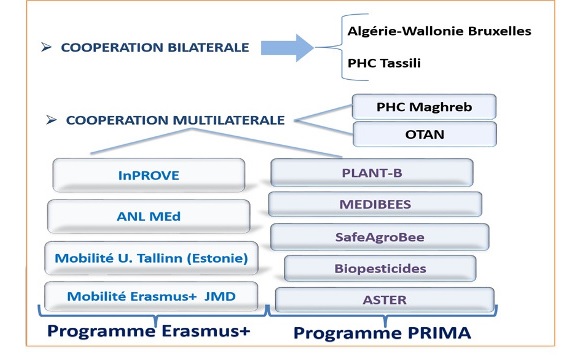
Bilateral cooperation
a. Algeria – Wallonia-Brussels Programme
Cooperation Project: Wallonia-Brussels WB in Bioinformatics:
This project aims to strengthen the teaching and research centre in bioinformatics at the M'Hamed BOUGARA University in Boumerdès. The objective is to develop a research focus on food allergies, which is as serious problem in Algeria as in the Wallonia-Brussels region.
Useful link:
http://www.federation-wallonie-bruxelles.be/index.php?id=65
Project manager : Prof. Souad KHEMILI
Email: s.khemili@univ-boumerdes.dz
b. PHC TASSILI Programme
The Hubert Curien (PHC) Tassili partnership is an Algerian-French cooperation programme. It supports joint research projects over a period of three years. . The funding includes the mobility of young Algerian PhD students in French laboratories and the mobility of French and Algerian researchers between France and Algeria. Under this programme, UMBB is a partner in the ongoing project:
Transport properties and study of the behaviour of thermosensitive membranes :
Approved in 2018, this project is part of the development of lignocellulosic resources and aims at a better use of cellulose from various Algerian plants.
Project manager : Prof. Djamel ALIOUCHE
Email: aliouche.djamel@univ-boumerdes.dz
Multilateral cooperation
a. PHC Maghreb Programme
The Hubert Curien Partnerships (PHC) are implemented and funded by France's Ministry for Europe and Foreign Affairs with support from the Ministry of Higher Education, Research and Innovation.
The PHC Maghreb is a regional partnership, whose objective is to develop the scientific and technological exchanges of excellence between the research laboratories of the three Maghreb countries and France through a research project.
Climatic variations and risk of mycotoxins in the wheat sector in the Maghreb: the general objective of the project is to improve the health security and sustainability of the wheat sector in the Maghreb countries by reducing the mycotoxins contamination of this sector by an integrated approach.
Project manager : Prof. Amar RIBA
Email: a.riba@univ-boumerdes.dz
b. OTAN Programme
The NATO Program for Science for Peace and Security (SPS) focuses on what civilian science and technology can do to address emerging security challenges and their implications for global security. It brings together researchers, experts and officials from Alliance and partner countries to work together to address these challenges.
DEFIR : Designing First Responders versatile detection and decontamination methods: The project goal is to develop multi-purpose detection and decontamination methods for first responders.
Project manager : Prof. Boudjema HAMADA
Email: bou.hamada@univ-boumerdes.dz
c. Erasmus + Programme
The Erasmus+ program is a European Union program for education, training, youth and sport. It provides opportunities for a wide range of individuals and organizations to train and gain experience. UMBB is a partner with 04 projects:
InPROVE project : (Initiation of the PROcess for Validation of acquired experience by Higher Education in Algeria) :
The aim of the project is to bring universities closer to the world of work by establishing a correspondence between training and skills. This project, which is part of ERASMUS+ CBHE, aims to establish the validation of acquired experience (VAE), which will enable Algerian universities to award diplomas through the recognition of qualifications and competences. The project is innovative in that VAE is a new idea for Algerian universities. The MESRS made it a priority and supported this project in order to carry out pilot experiments in VAE that can be replicated later in all Algerian universities.
Newsletter Bureau National Erasmus+ (FR)
Newsletter Bureau National Erasmus+ (AR)
Circular Visits – Project Presentation
Visites circulaire-U.Montpellier
Visites circulaire-U.Porto.
Visites circulaire-U.Barcelone.
-
https://inprove.edu.umontpellier.fr/
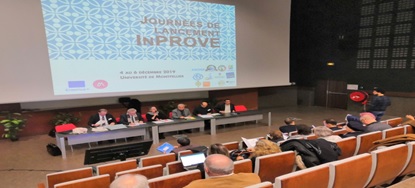 co-coordinator: Prof. Abdelaziz TAIRI
Email: a.tairi@univ-boumerdes.dz
co-coordinator: Prof. Abdelaziz TAIRI
Email: a.tairi@univ-boumerdes.dz
ANL-MEd: The Algerian National Laboratory for Maintenance Education:
Part of the Erasmus+ CBHE programme, its aim is to participate as a partner in the creation of a national maintenance laboratory. This will provide a framework for developing the implementation of specialisation and training programmes in the field.
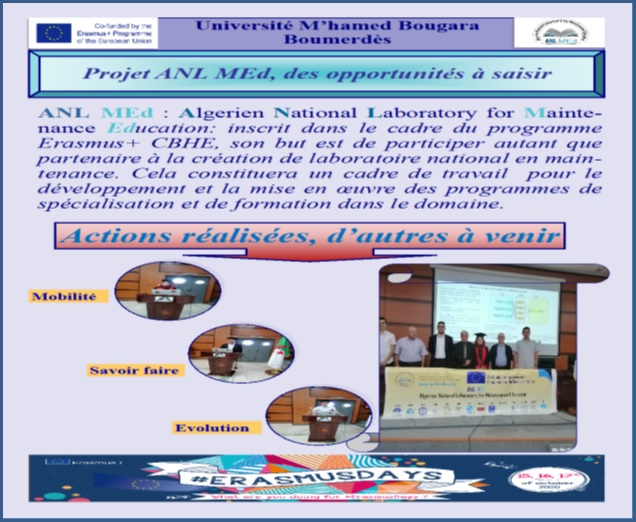 Project manager : Prof. Smail ADJERID
Email: s.adjerid@univ-boumerdes.dz
Project manager : Prof. Smail ADJERID
Email: s.adjerid@univ-boumerdes.dz
International Credit Mobility/Tallinn University Project (Estonia):
This action supports hybrid intensive programmes, which allow groups of higher education institutions to jointly develop hybrid mobility activities and programmes for students, academic and administrative staff.
Contact person : Prof. Boudjema HAMADA
Email: bou.hamada@univ-boumerdes.dz
Erasmus+ Joint Master Degree (JMD), Photonics for Security, Reliability and Safety: from instrumentation to data science, PSRS..
The spirit of PSRS: «European excellence in higher education in photonics, artificial intelligence and nanotechnology in the global security and safety markets». It is a European university consortium offering the PSRS Master Degree, designed and operated by a university-enterprise cooperation of 4 European universities, 26 university partners and 25 industrial leaders worldwide.
Contact person : Dr. Dalila CHERIFI
Email: da.cherifi@univ-boumerdes.dz
d. PRIMA Programme
PRIMA is a joint program to address the main challenges of water resources and food systems. It is designed to promote research and innovation capabilities and develop common knowledge and innovative solutions to improve efficiency, security, safety and sustainability of agri-food systems and integrated water supply and management in the Mediterranean area.
Current projects :
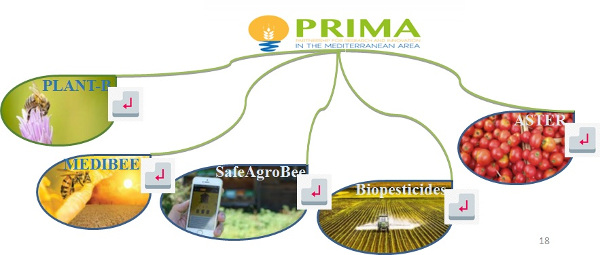
PLANT-B : A sustainable mixed cropping-beekeeping system in the Mediterranean basin:
It is a research project that aims to increase the sustainability of Mediterranean agroecosystems in the fields of citrus fruits, aromatic and medicinal plants (PAM) and in the beekeeping sector. Led by the Benaki Phytopathological Institute (BPI) based in Athens (Greece), the project brings together 10 partners from 6 Mediterranean countries. PLANT-B is funded by PRIMA – section1 for 36 months starting in 2019.
- Flyers:
- Useful link:
https://www.era-learn.eu/network-information/networks/prima/section-1-call-farming-systems-2018/a-sustainable-mixed-cropping-beekeeping-system-in-the-mediterranean-basin
Project manager : Prof. Arezki MOHAMMEDI
Email: a.mohammedi @univ-boumerdes.dz
Activities
radio show
webinaire
Flyers:
MEDIBEES : Monitoring of the Mediterranean Honeybee Subspecies and their Resilience to Climate Change for the Improvement of Sustainable Agro-Ecosystems:
Le but du projet est d’identifier les colonies d’abeilles domestiques et les sous-espèces les plus résistantes au changement climatique et aux pathogènes communs dans toute la région méditerranéenne. Les abeilles sont essentielles aux systèmes agricoles durables et le projet vise à contribuer à cette durabilité dans le contexte de la désertification accrue de la région en raison du changement climatique. On s’attend à ce que MEDIBEES génère de nouvelles informations génétiques et de nouveaux marqueurs qui seront essentiels à la sélection de races d’abeilles résistantes.
Personne de contact: Prof. Noureddine ADJELANE
Email: noureddine.adjlane@univ-boumerdes.dz
MEDIBEES : Monitoring of the Mediterranean Honeybee Subspecies and their Resilience to Climate Change for the Improvement of Sustainable Agro-Ecosystems:
The aim of the project is to identify the most resistant honey bee colonies and subspecies to climate change and common pathogens throughout the Mediterranean region. Bees are essential to sustainable agricultural systems and the project aims to contribute to this sustainability in the context of the region’s increased desertification due to climate change. It is expected that MEDIBEES will generate new genetic information and markers that will be essential for the selection of resistant bee breeds.
Project manager : Prof. Noureddine ADJELANE
Email: noureddine.adjlane@univ-boumerdes.dz
SafeAgroBee : Preserving the resilience of agroecosystems to climate change through effective pollination and sustainable beekeeping:
SafeAgroBee’s overall objective is to contribute to the adaptation and mitigation of the effects of climate change and other factors negatively influencing the sustainability and resilience of the agricultural system in the Mediterranean basin, ensuring farmers incomes and food security.
- Useful link:
https://www.era-learn.eu/network-information/networks/prima/section-2-call-2020-multitopic/preserver-la-resilience-des-agroecosystemes-face-au-changement-climatique-grace-a-une-pollinisation-efficace-et-une-apiculture-durable
Project manager : Prof. Noureddine ADJELANE
Email: noureddine.adjlane@univ-boumerdes.dz
BIOPESTICIDES : Development of Bio-Pesticides and Herbicides for Sustainable Agricultural Production :
Agricultural crops are constantly exposed and/or threatened by pests that affect their growth and the quality of their products. In addition, overuse and misuse of synthetic chemicals can have harmful effects on humans and the environment. This has increased the demand for the development and implementation of systems using biopesticides as a safe alternative to reduce the use of agrochemical inputs and enable sustainable production. The biopesticides project aims to develop and implement natural pesticides (plants and microalgae).
-The long-term goal is to provide alternative, economic and ecological biopesticides that could partially replace the synthetic chemicals used to date.
Useful link:
https://mel.cgiar.org/projects/biopesticides
Project manager : Prof. Fatma ACHEUK
Email:f.acheuk@univ-boumerdes.dz
ASTER : Agroecology-inspired Strategies and Tools to Enhance Resilience and ecosystem services in tomato crop:
ASTER aims to create a management model for small-scale. Mediterranean basin based on the application of major agroecological principles such as:
- Protection (conservation) and enhancement of functional biodiversity underground, to increase and exploit ecosystem services (protection, nutrition, pollination) in place of the use of external synthetic inputs;
- Sustainable management of major pests and pathogens;
- Reduce the environmental impact of plant protection practices;
- Circular production line to approach “zero waste”.
Project manager : Dr. Farida BENZINA
Email: f.benzina@univ-boumerdes.dz

 (3).jpg)
.jpg)
.jpg)
.jpg)
.jpg)
 (2).jpg)
 (2).jpg)
.jpg)

 co-coordinator: Prof. Abdelaziz TAIRI
Email: a.tairi@univ-boumerdes.dz
co-coordinator: Prof. Abdelaziz TAIRI
Email: a.tairi@univ-boumerdes.dz
 Project manager : Prof. Smail ADJERID
Email: s.adjerid@univ-boumerdes.dz
Project manager : Prof. Smail ADJERID
Email: s.adjerid@univ-boumerdes.dz





